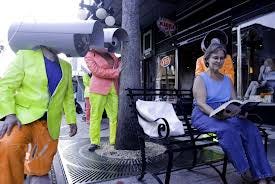Police want access to private surveillance cameras the public be damned.

Charlotte, NC - In a bid to expand its surveillance network, Charlotte-Mecklenburg police want to connect to private businesses’ cameras, which would allow officers to monitor malls, gas stations and banks across the county.
Questions have risen as the Charlotte-Mecklenburg police department seeks to expand its use of video cameras and specialized microphones around the city.
Read more here: http://www.charlotteobserver.com/2012/12/13/3722752/as-police-expand-surveillance.html#storylink=cpy
Although Police Chief Rodney Monroe did not say how many cameras the department hopes will be linked to its network, the policy change would be an unprecedented expansion since the department started using cameras 12 years ago.
The department is already connected to private cameras at Time Warner Cable Arena, Bank of America Stadium and bank buildings, police leaders said Monday. Police say expanding the network would help them catch more criminals and prevent crimes.
But the cameras would also collect more images of people who haven’t done anything wrong and store the video on police servers for weeks.
The department’s plans about the potential public-private partnerships were announced Monday as Monroe updated city council members on how his department intends to use the new technology. Much of the technology was paid for by money CMPD received from the federal government to boost security during the Democratic National Convention.
Read more here: http://www.charlotteobserver.com/2012/12/10/3719038/charlotte-mecklenburg-police-want.html#storylink=cpy
Police have access to about 650 cameras, Monroe said. In contrast, Chicago, which is nearly four times as large as Charlotte, had an estimated 10,000 cameras by 2011. Baltimore, with 130,000 fewer people, had more than 500 cameras, concentrated in the city’s downtown area.
So far, prosecutors at the Mecklenburg County District Attorney’s Office say the ShotSpotter microphones and the camera network haven’t given rise to courtroom debates over individual privacy rights.
The office’s homicide team often pulls surveillance video from convenience stores or hotels, but Assistant District Attorney Bill Stetzer said he can’t remember a recent case with evidence from one of the cameras watched by CMPD.
Privacy advocates say the city should have a more input on how much surveillance the police department uses.
“The people of Charlotte should be able to decide democratically what kind of surveillance power they want to be subjected to,” said Mike Meno, spokesman for the American Civil Liberties Union of North Carolina. “This expansion shouldn’t be just because surveillance was dialed up during the DNC and we’re just going to leave it in place after that.”
Read more here: http://www.charlotteobserver.com/2012/12/10/3719038/charlotte-mecklenburg-police-want.html#storylink=cpy
City Council member Beth Pickering, an at-large Democrat, asked whether the department would offer a public process for determining where police place cameras and other technology. Monroe did not directly answer the question.
But the police chief told the Observer the department would offer no such process. The cameras, microphones and other sensors will be placed in public thoroughfares in full view of the public, he said. (The public be damned, the police refuse to tell the public whats going on)
Baltimore’s defense attorneys haven’t used privacy questions as a tactic in criminal cases, Embry said, because the videos capture only public places. Moreover, city residents have come to expect surveillance as a sort of standard of protection, Baltimore officials said.
“Today, I don’t see a lot of people worried about it,” said Doug Ward, director of public safety leadership at Johns Hopkins University and a former Maryland State Police major.
Just as it remains to be seen exactly how ShotSpotter will be put to use and how effective it is, Charlotte police are also in the midst of developing guidelines for monitoring some 650 cameras spread throughout the city.
Officials are working within the department to determine where those cameras, concentrated uptown during the DNC, should be moved, how long video footage should be stored and how to monitor the people who watch the cameras.
One thing that’s absolutely clear, deputy chief Medlock said: Those cameras, whether owned by the city or by private companies, will be focused only on public streets and intersections.
Officials from other cities say when creating surveillance policies, the details are important.
Baltimore, for instance, has been highlighted in a recent study by the Urban Institute for its effective use of surveillance video.
The surveillance of some 500 of the city’s downtown cameras is overseen by a group of people trained to monitor the feeds, Guglielmi said. These monitors work closely with 911 dispatchers, focusing cameras on areas where crimes are occurring, but they also watch for suspicious activity.
Read more here: http://www.charlotteobserver.com/2012/12/13/3722752/as-police-expand-surveillance.html#storylink=cpyhttp://www.charlotteobserver.com/2012/12/10/3719038/charlotte-mecklenburg-police-want.html
http://www.charlotteobserver.com/2012/12/13/3722752/as-police-expand-surveillance.html



